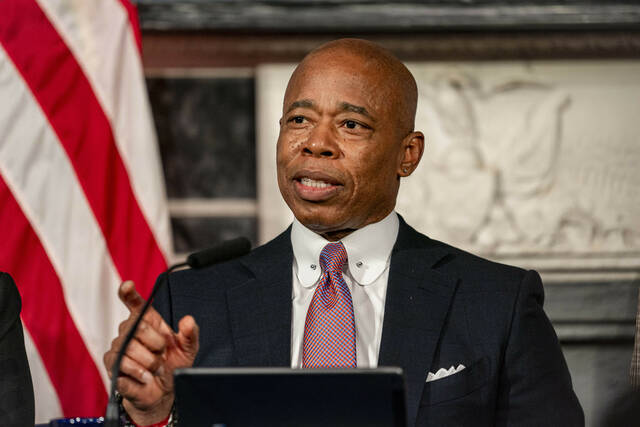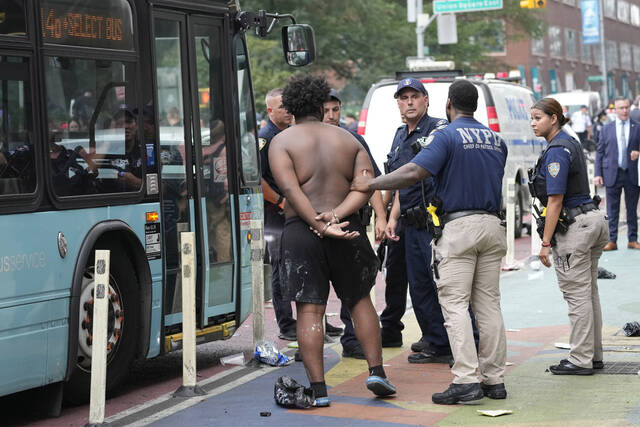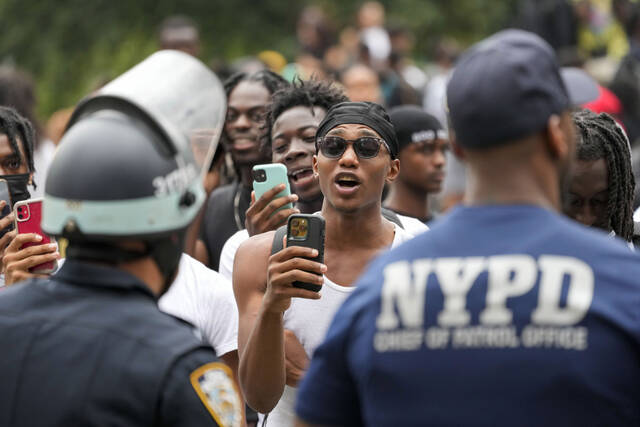NYC mayor vetoes bills banning solitary confinement in jails and expanding reporting of police stops
NEW YORK — New York City’s mayor vetoed bills Friday aimed at banning solitary confinement in city jails and requiring more transparency in police encounters with civilians, setting up a faceoff with the City Council, which says it has enough votes to override him.
Democratic Mayor Eric Adams said the solitary confinement restrictions would make jails more dangerous and that the expanded reporting requirements for police would only bog down officers in paperwork, putting public safety at risk.
The former police captain announced his veto of the police stops bill during a City Hall news conference, where law enforcement officials and community leaders joined him.
Adams argued that the new mandates would harm the police work that led to an overall drop in crime last year, including a 12% decline in homicides and a 25% decrease in shootings.
“We don’t want to handcuff police. We want to handcuff bad people. That’s the goal,” Adams said. “It’s about making sure we’re not preventing them from doing their job.”
Hours later — and with decidedly less fanfare — the mayor’s office announced that he had also vetoed the solitary confinement bill, citing concerns raised by a federal monitor appointed to evaluate operations at the city’s jails.
“Under our administration, the city’s jails are getting safer — but this bill would have taken us in the wrong direction,” Adams said in the written announcement.
City Council Speaker Adrienne Adams, a fellow Democrat who is not related to the mayor, confirmed that the council was prepared to override him on both fronts.
She argued that the jail restrictions are needed to address problems at Riker’s Island, which faces possible federal takeover in order to curb violence at the infamous island jail complex. She also pushed back at the mayor’s claims that solitary confinement has not been utilized in city jails for years.
“Solitary confinement, by any name, has been proven to cause physical, psychological, and emotional harm, and its use has contributed to continued violence and deaths on Rikers Island,” the speaker said in a statement “We cannot allow the human rights and safety crisis on Rikers to continue by maintaining the status quo of failed policies and practices. “
She also argued the policing bill was warranted because civilian complaints against officers are at their highest level in more than a decade.
“The false narrative that we cannot have transparency is bad for our city, and belies the fact that accountability is vital to improving public safety by increasing trust,” Adams said in a separate statement.
The solitary confinement bill would place a four-hour limit on isolating inmates who pose an immediate risk of violence to others or themselves in “de-escalation” units.
Only those involved in violent incidents could be placed in longer-term restrictive housing, and they would need to be allowed out of their cells for 14 hours each day and get access to the same programming available to other inmates.
The policing bill, known as the ” How Many Stops Act,” requires officers to publicly report on all investigative stops, including relatively low-level encounters with civilians.
Among other things, the legislation would require the NYPD to report on where the stops happen, demographic information on the person stopped, the reason for the encounter, and whether the encounter led to any use-of-force or enforcement action.
Police are currently only required to fill out reports following stops in which they question and search civilians.
The council approved the two measures in the final days of 2023 with enough votes backing both bills to overrule a mayoral veto and ensure they become law, unless several members change their stance.
Local groups that supported the measures urged the council to immediately hold an override vote.
New York City Public Advocate Jumaane Williams, who introduced the bills, dismissed Adams’ criticism as “fear-mongering” and misinformation.
“A full understanding of the legislation makes it clear that enacting these reforms will be good for public safety, while preventing them will make our city less safe,” he said in a statement ahead of the mayor’s vetoes.
Remove the ads from your TribLIVE reading experience but still support the journalists who create the content with TribLIVE Ad-Free.




